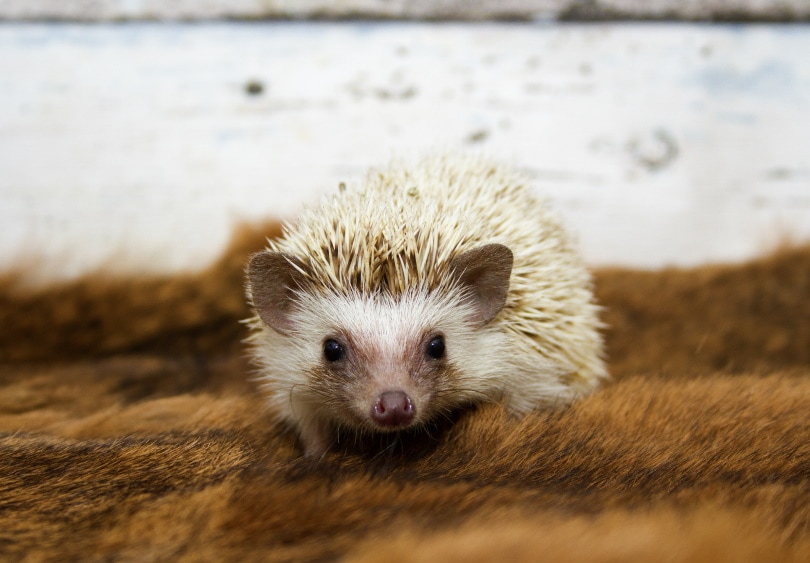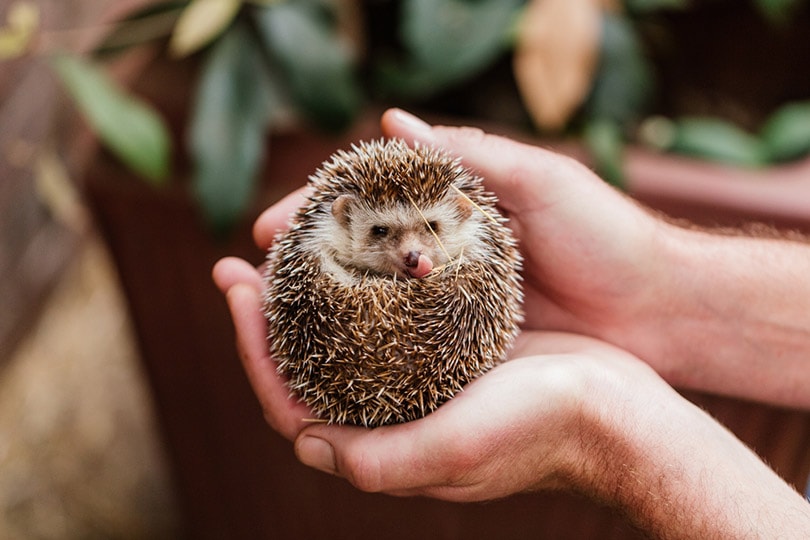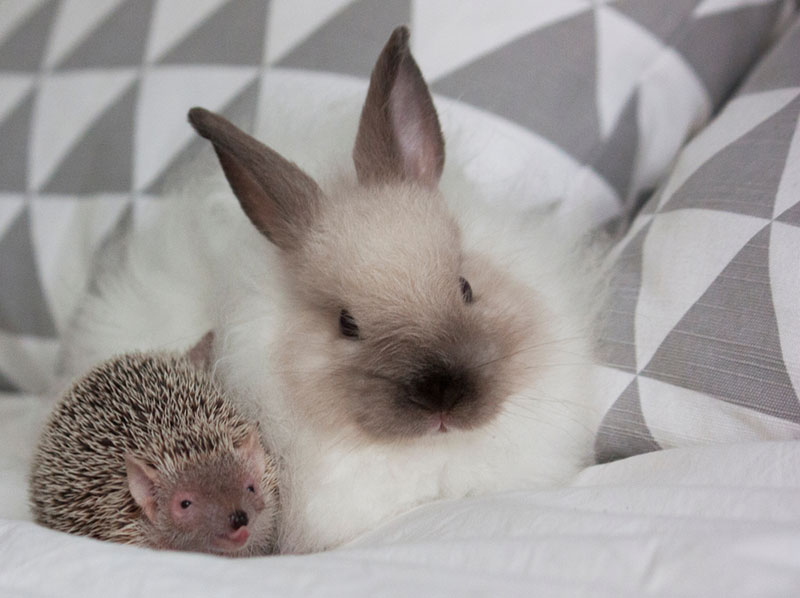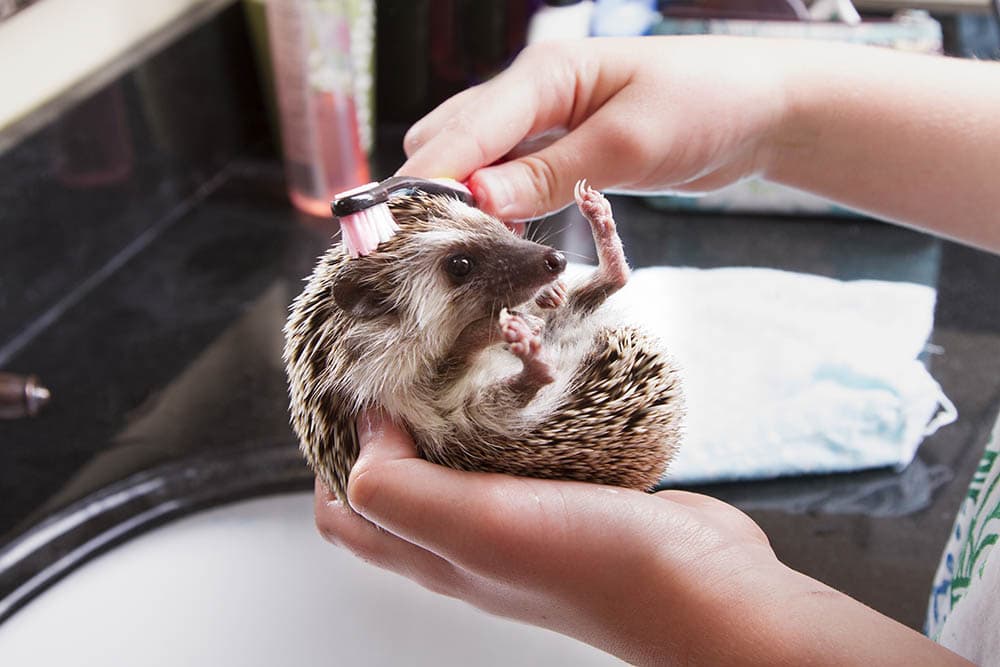
Hedgehogs are shy creatures that can take some time to warm up to people. Patience, time, and commitment are required for these pets to develop a bond with their owners. So, many hedgehog owners will use treats to bond with their small pet or simply because these pets are just so adorable.
Hedgehogs commonly get referred to as insectivores or obligate carnivores. Like cats and ferrets, their diet consists mainly of meat protein. However, hedgehogs can enjoy some fruits and vegetables as treats. They like to rummage and forage around in the wild. So, if they happen upon some berries, they may choose to eat them. Therefore, raspberries can be a tasty treat for your hedgehog, but you should only give them as occasional treats.
One way that pet owners can show affection in a way that their pets understand is to provide their daily meals and special treats consistently. Your hedgehogs will greatly appreciate it when you feed them, so keep reading to make sure you’re giving them a healthy and well-balanced diet.
 What Fruits and Vegetables Can Hedgehogs Eat?
What Fruits and Vegetables Can Hedgehogs Eat?
Hedgehogs can eat raspberries and most berries. If you choose to give your hedgehog berries, make sure that you only feed them organic ones. Non-organic berries may contain traces of chemicals or pesticides, which can be extremely harmful to your pet.
Since fruits and vegetables aren’t really part of hedgehogs’ natural diet, they may just not have an interest in them. However, you can experiment and see which ones your particular hedgehog may like.
Since fruits and vegetables are treats, only give them to your hedgehog just a couple of times a week. Avoid dried fruit because they have a concentrated amount of sugar.
Also, make sure to remove any peels and rinds from any fruit and vegetables, such as apples and green peppers. Eliminating these parts will ensure that your hedgehog doesn’t consume any chemicals or pesticides that might have gotten sprayed onto them.
Hedgehogs can have sensitive stomachs, so refrain from introducing them to too many new foods at a time. Only introduce one new treat a week to lower the risk of giving them an upset stomach.
Also, hedgehogs don’t have incisors as rodents do, so they don’t need to gnaw or chew. So, it’ll be helpful for them if you cut up hard pieces of fruit and vegetables into small pieces. You can also steam or boil tougher vegetables, such as carrots so that it’s easier for your hedgehog to chew.

What Types of Treats Can I Give a Hedgehog?
If you decide to give your hedgehog meat proteins, make sure to cook them with no oil or seasonings. Also, never give your hedgehog insects you caught in your yard or neighborhood. There’s a good chance that these insects carry parasites or have ingested lawn chemicals.
Instead, your local pet stores will have insects that are safe for pets to eat. You can buy them live, freeze-dried, or canned.
Although insects are a primary part of a hedgehog’s diet in the wild, they’re treats for domesticated hedgehogs. In the wild, hedgehogs spend their days foraging for miles and need the fat and energy from insects to keep up with this lifestyle. Wild hedgehogs also need to bulk up in the fall so that they can hibernate through winter.
Since domesticated hedgehogs aren’t as active and don’t need to hibernate, they shouldn’t regularly eat insects. Hedgehogs are prone to obesity, so you want to make sure that they eat a well-balanced diet. Insects are treats that your hedgehog can have a couple of times a week.

What Should I Not Feed Hedgehogs?
Hedgehogs have a short and simple digestive system, so they can only process certain types of food. Therefore, some foods that are safe for humans can be extremely dangerous for hedgehogs.
Avocados and grapes are particularly toxic to hedgehogs. Also, nuts and seeds can be choking hazards for hedgehogs. They can easily get stuck in their mouths, which can lead to dental issues.
If your hedgehog has eaten any of these foods, make sure to contact your veterinarian right away. Helpful information for them will be how much of the food your hedgehogs consumed, the time they ate the food, and any symptoms they’re showing.
What Food Should I Put Out for Hedgehogs?
Hedgehogs generally eat at night, so you can start to lay food out in the evening. If it’s difficult to match your hedgehog’s sleep cycle, you can also leave food out for free feeding. Just make sure that you don’t leave any fresh food out because it can go bad if left at room temperature for too long.
One of the best ways to ensure that your hedgehog eats a nutritional diet is to feed them high-quality hedgehog food. The main benefit of hedgehog food is that it contains the right amount of protein, omega-3 fatty acids, vitamins, and taurine that hedgehogs need. It’s also in the form of small pieces with the right consistency, so your hedgehog doesn’t have difficulty chewing and swallowing it.
As a general rule of thumb, adult hedgehogs can eat two tablespoons of hedgehog food a day and a couple of special treats spread out throughout the week.
The best way to find the right amount of food for your hedgehog is to work with your veterinarian. Together, you can monitor your hedgehog’s food intake and weight to make sure that your hedgehog eats a healthy diet with the correct proportions.

Can I Make My Own Hedgehog Food?
Preparing homemade recipes is another option for feeding your hedgehog. The main benefit of serving homemade recipes is that you know exactly what’s going into your hedgehog’s diet. Making your own hedgehog food can be suitable for hedgehogs with food allergies.
However, it definitely takes a lot of extra work to make sure your hedgehog eats a well-balanced meal. Hedgehogs need a high-protein diet with some fats, carbohydrates, fiber, and water.
At least 20% of your hedgehog’s meal should be protein. The meal breakdown should also have 5% to 15% of fat and 15% of fiber. If you’re concerned about your hedgehog’s vitamin and mineral intake, you can supplement your meals with a hedgehog multivitamin supplement.
If you want to create a homemade diet for your hedgehog, make sure to consult with a veterinarian specializing in exotic pets first. A fresh meal may seem like a good idea, but it can potentially hurt your hedgehog in the long run if it doesn’t contain the right nutritional value.
 Wrapping Up
Wrapping Up
Wild hedgehogs are insectivores, but domesticated pets follow a diet with a closer resemblance to an obligate carnivore’s diet. Domesticated hedgehogs require a lot of protein and lower amounts of fat than wild hedgehogs.
In general, a healthy hedgehog diet will consist of high-quality hedgehog food and occasional treats, such as raspberries. Make sure to introduce new treats slowly to avoid upsetting their stomachs.
Now that you know what’s safe for your hedgehogs to eat, free to test out which foods your hedgehogs like. You’ll learn so much more about them, and they’ll also appreciate you for introducing variety into their diet.
- Related Read: Can Hedgehogs Eat Oranges?

 What Fruits and Vegetables Can Hedgehogs Eat?
What Fruits and Vegetables Can Hedgehogs Eat?





